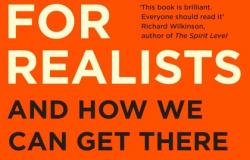Book Review – Utopia for Realists: And How We Can Get There

Utopia for Realists: And How We Can Get There by Rutger Bregman. London: Bloomsbury 2017. 336 pp., £16.99 hardcover 9781408890264, £8.99 paperback 9781408893210
The Dutch historian Rutger Bregman’s impressive book, Utopia for Realists, has received a huge number of endorsements and media attention, and has sparked a renewed interest in the politics of work and poverty reduction, and particularly universal basic income. The overarching argument of the book is that we need utopias and that ideas can change the world. However, the particularly impressive aspect of Utopia for Realists is that it puts forward good ideas – on poverty reduction, shortening working hours, incentivising work that is socially useful, and reconsidering what ‘work’ means in the context of automation – not by relying merely on ethical appeals but using fact-based economic arguments, and presented in plain language that everyone can understand. The book is a useful practical tool in the task of political persuasion and in confronting the problems of poverty and overwork, which have arisen, Bregman points out, despite a growth in overall prosperity in the past 200 years.
 Bregman’s main proposal on poverty reduction is universal basic income (UBI), or as he calls it, ‘giving free money to everyone’. A wide range of examples are cited, including a basic income experiment in the small town of Dauphin in Canada in the 1970s, along with more recent examples of poverty reduction initiatives in Utah and Amsterdam. Simply giving people free money, it is shown, leads to reductions in crime and health problems, and to improved school performance, mental health, economic growth and gender equality.
Bregman’s main proposal on poverty reduction is universal basic income (UBI), or as he calls it, ‘giving free money to everyone’. A wide range of examples are cited, including a basic income experiment in the small town of Dauphin in Canada in the 1970s, along with more recent examples of poverty reduction initiatives in Utah and Amsterdam. Simply giving people free money, it is shown, leads to reductions in crime and health problems, and to improved school performance, mental health, economic growth and gender equality.
And this approach largely pays for itself. Fighting and preventing homelessness, for example, ‘enjoys double or triple returns in savings on social services, police and court costs’ (p.72). Bregman argues that ending poverty in the US would cost less than 1% of GDP, roughly a quarter of US military spending (p.43).
Rather than disincentivising work, UBI would instead enable people to seek jobs with true opportunities for growth and advancement. It is true, Bregman argues, that the poor make bad decisions. But this is caused by poverty itself: scarcity narrows your focus and the long-term perspective is lost. Bregman claims that poverty corresponds to a loss of 13 or 14 IQ points – comparable to losing a night’s sleep or alcoholism (p.58). He cites an intriguing example of a recent experiment with sugarcane farmers in rural India to support this.
Universal Basic Income has attracted a variety of criticisms, not least that it breaks the link between income and work, thereby potentially putting jobless recipients of UBI in a position of lower status and power. Bregman seems unconcerned by this, dismissing the idea that one must earn a living as a dogma and a ‘nineteenth-century mindset’. Alternatives to UBI put forward on the political left include universal basic services and Job Guarantee.
However, regardless of the merits of each of these options, Bregman’s underlying point that reductions in poverty pay for themselves in the long run, socially and economically, is a strong one. As he puts it, poverty is expensive. Also reductions in inequality promote social mobility. We are more likely, Bregman asserts, to achieve the American dream in Sweden than in the USA (p.66).
One of the most convincing arguments in the book is for shorter working time. Despite Keynes’ prediction in 1930 that by 2030 we would be working 15 hours a week, since the 1980s economic growth has translated into more stuff instead of more leisure, and we have an epidemic of stress and overwork, which actually reduces productivity. According to Bregman, then, working less is ‘the solution to (almost) everything’. Working less reduces stress, reduces our ecological footprint, reduces accidents (many caused by overtime and exhaustion), and reduces unemployment (through job sharing). It also reduces inequality and part-time work is good for an aging population. And, importantly, it is what many people want.
As well as reducing working hours and rethinking economic indicators such as Gross Domestic Product (GDP), we need to incentivise work that is socially useful. Bregman entertains the idea that what happens when workers go on strike can be used as a measure of whether a job is valuable for society. He describes a strike of garbage collectors in New York in 1968, which brought the city to a standstill within a few days. He then describes a strike of bank employees in Ireland in 1970 – but after 6 months the strike had little negative effect on daily life, as people forged a radically decentralised monetary system based around pubs. (pp.159-60) Similarly, if lobbyists, tax accountants, social media consultants, telemarketers or high-frequency traders went on strike, it might not have much effect.
Many people, Bregman argues, do jobs that we could do without. Instead of creating wealth, they just shift it around (p.155). And it is jobs that shift money around, creating little of tangible value, that often net the best salaries. David Graeber’s concept of ‘bullshit jobs’ is used to explain our culture of overwork. Bregman cites a 2015 survey, according to which 37% of British workers believe that their jobs are worthless and have no value to society (p.165). We need to get rid of the dogma that a higher salary is automatically a reflection of societal value.
The advance of technology and the rise of robots, according to Bregman, is another very strong argument in favour of UBI/poverty reduction policies and shorter working hours. In the course of the twentieth century, as machines destroyed jobs, new ones were created. But, he claims, this has changed from around 2000 onwards, and we are witnessing the exponential growth of machine computing power (p.190). Low paid jobs and even outsourced work in Africa and Asia will eventually be replaced by machines when technology catches up: ‘even the sweatshops in Vietnam and Bangladesh will be automated’. (p.192)
Bregman puts forward his most utopian proposal towards the end of the book. Open borders, he argues, is one measure that could wipe out all poverty, raising everybody in Africa above the Western poverty line and make us richer too. Open borders for people (not just for goods and services) would make the world as a whole roughly twice as rich and would boost global wealth by roughly 65 trillion US dollars (p.216). Contrary to some narratives, as opposed to ‘taking our jobs’, migrants actually create more employment opportunities: ‘a bigger workforce means more consumption, more demand, more jobs’. (p.225)
Added to this, Bregman contends, ‘Borders are the single biggest cause of discrimination in all of world history’ (p.217), and inequality in gender or race pales in comparison to inequality caused by one’s location in the world. He does concede however that opening borders can only be done slowly and gradually. But if all developed countries let in just 3% more immigrants, it would make a dramatic difference to global poverty (p.230).
Bregman concludes the book with some practical advice on how progressive utopian ideas can be advanced. Clear language is emphasised as crucially important: ‘If you can’t explain your ideal to a fairly intelligent twelve-year-old, after all, it’s probably your own fault. What we need is a narrative that speaks to millions of ordinary people.’ (p.258)
Although the book develops an impressive array of utopian ideas, there are some interesting omissions. Bregman does not discuss economic democracy (democratising economic decision making), particularly the theory and practice of workers cooperatives and Community Wealth Building (CWB). As well as being compelling ideas / examples in themselves (e.g. community wealth building in Cleveland, Ohio, and Preston, UK), these approaches could also be a means by which some of Bregman’s proposals could be implemented – especially shorter working hours and mitigating the effects of automation. Democratic input into economic decision-making would, I suggest, be necessary to implement the ‘massive redistribution’ (p.199) of money, time, and taxation (on capital instead of labour) that Bregman calls for. The question of who has the power to make decisions about technology, work and poverty, given the hierarchical nature of capitalist power structures, and how that power could be challenged by a process of democratisation at state and civil society level, and also within workplaces themselves, is an important issue that he doesn’t discuss.
However, notwithstanding these reservations, this book is a pleasure to read. It provides a wealth of good arguments, put forward in plain language addressed to the wider public, and backed up by an enormous amount of detail and evidence, all of which can be used to challenge and move the ‘Overton window’, so that ideas that were previously deemed unrealistic or unreasonable can be seen as key to building a better world.
Dr. Richard Murphy teaches in the School of Government and International Affairs and the Department of Philosophy in Durham University.

